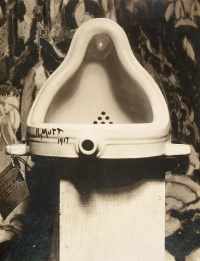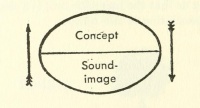Concept
From The Art and Popular Culture Encyclopedia
|
"In conceptual art the idea or concept is the most important aspect of the work. When an artist uses a conceptual form of art, it means that all of the planning and decisions are made beforehand and the execution is a perfunctory affair. The idea becomes a machine that makes the art." – Sol LeWitt, "Paragraphs on Conceptual Art", Artforum, June 1967. |
![Diagram of the human mind, from Utriusque cosmi maioris scilicet et minoris metaphysica, page 217[1] by Robert Fludd](/images/thumb/200px-Diagram_of_the_human_mind,_from_Robert_Fludd_(1574-1637),_Utriusque_cosmic_maioris_scilicet_et_minoris_metaphysica.jpg)

|
Related e |
|
Featured: |
Concepts are defined as abstract ideas or general notions that occur in the mind, in speech, or in thought. They are understood to be the fundamental building blocks of thoughts and beliefs. They play an important role in all aspects of cognition. As such, concepts are studied by several disciplines, such as linguistics, psychology, and philosophy, and these disciplines are interested in the logical and psychological structure of concepts, and how they are put together to form thoughts and sentences. The study of concepts has served as an important flagship of an emerging interdisciplinary approach called cognitive science.
In contemporary philosophy, there are at least three prevailing ways to understand what a concept is:
- Concepts as mental representations, where concepts are entities that exist in the mind (mental objects)
- Concepts as abilities, where concepts are abilities peculiar to cognitive agents (mental states)
- Concepts as Fregean senses (see sense and reference), where concepts are abstract objects, as opposed to mental objects and mental states
Concepts can be organized into a hierarchy, higher levels of which are termed "superordinate" and lower levels termed "subordinate". Additionally, there is the "basic" or "middle" level at which people will most readily categorize a concept. For example, a basic-level concept would be "chair", with its superordinate, "furniture", and its subordinate, "easy chair".
A concept is instantiated (reified) by all of its actual or potential instances, whether these are things in the real world or other ideas.
Concepts are studied as components of human cognition in the cognitive science disciplines of linguistics, psychology and, philosophy, where an ongoing debate asks whether all cognition must occur through concepts. Concepts are used as formal tools or models in mathematics, computer science, databases and artificial intelligence.
In informal use the word concept often just means any idea.
Ideasthesia
According to the theory of ideasthesia (or "sensing concepts"), activation of a concept may be the main mechanism responsible for the creation of phenomenal experiences. Therefore, understanding how the brain processes concepts may be central to solving the mystery of how conscious experiences (or qualia) emerge within a physical system e.g., the sourness of the sour taste of lemon. This question is also known as the hard problem of consciousness. Research on ideasthesia emerged from research on synesthesia where it was noted that a synesthetic experience requires first an activation of a concept of the inducer. Later research expanded these results into everyday perception.
There is a lot of discussion on the most effective theory in concepts. Another theory is semantic pointers, which use perceptual and motor representations and these representations are like symbols.
See also
- Abstraction
- Categorization
- Class (philosophy)
- Notion (philosophy)
- Concept and object
- Concept car
- Concept map
- Conceptual art
- Conceptual blending
- Conceptual character
- Conceptual history
- Conceptual metaphor
- Conceptualism
- Definitionism
- Essentially contested concept
- Formal concept analysis
- Fuzzy concept
- Hypostatic abstraction
- List of philosophical concepts
- Idea
- Meme
- Misconception
- Object (philosophy)
- Open concept
- Philosophy
- Schema (Kant)
- Social construction
- Symbol grounding problem
- Thick concept




